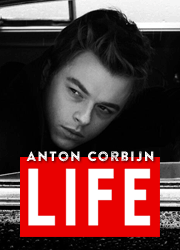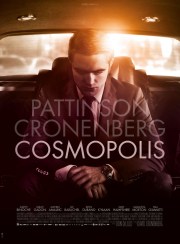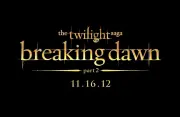Where you familiar with Don DeLillo’s novel?
No. Nut I had read a few of his other novels. First I read the script that David Cronenberg sent me and then the novel. One is incredibly faithful to the other, in a way that it seems impossible, for a novel that seemed impossible to adapt. But even before reading the book, what I was most impressed was the tension without release and the fast rhythm of the script.
What caught your attention the most about the movie?
Cronenberg, obviously. I’ve acted in other movies and non of them reached the level of what I expected working with him would be. He did not disappoint… I knew that it would be very creative and that it would be an authentic experience. And I was also very attracted to the prose in the script, similar to a long poem. And a mysterious poem too. Usually, when you read a script, you know very quickly what is it about, where is it going, how will it end; even if there are unexpected or sophisticated twists, or plot inversions. But this time it was completely different, the more I read, the least I could imagive where was it going and I wanted to be part of it even more. It can no be boxed in any movie genre, it stands as it’s own.
When you read the script the first time, did you see yourself playing the part? Could you imagine how it would look visually?
Not at all. The first time I spoke with David, that is exactly what I told him, that I could not visualize it and he said that he thought it was good that I couldn’t. And at this point, we where not thinking much in anticipation, there was an evolution that was progressive, organic; starting with the text and then going into the many visual options to give form to the movie. It’s a life process. Even during the first week of filming, we would ask ourselves how would the movie look once it was done. It was fascinating, I felt like the movie made itself.
Read more after the jump!
Now that it’s done, how different is the movie from the script, or did you stick to it like it was written?
It’s hard to say, because the movie acts in different levels. I’ve seen it twice; the fist time I was impressed by it’s farce side, which I know would be there while we where filming, but it was unexpectedly apparent. The second time, the seriousness of what was at risk prevaled. Both times, there was an audience, but their reactions where varied, from laughter to tension towards the dark side that Cosmopolis has. Despite it’s complexity, it amazed me the way that it reached a wide array of emotions.
In your opinion, Who is Eric Packer? How would you describe him?
For me, Eric is someone that feels he belongs to a different reality, like he was born in another planet and that tries to discover in which reality he should be living. In fact, he does not understand the world the way it is. However, he does have enough understanding of the world to make a fortune in it. Sure, but in a very abstract way. The banking, trading, speculating, all those are disconnected activities, that he has done very well, not as a genuine specialist or a master mind, but thanks to a sort of instinct, something more misterious, with the help of algorithms not very different to magic formulas. You can see in the movie, as well as in the book, that the approach of financial data tends to protect him in the future, so much so that he does not know how to live in the present. Probably, he understands how the real world works in a way, but in peculiar and unknown ways.
Did you talk about this with David Cronenberg?
A little, yes, but he liked that I looked for something without explanation or unexplainable. He liked, specially, that I acted like I had no idea of what I was doing and when I felt that I was doing things with a chain of cause an effect, or trying to explain Eric’s behavior, he could cut the take. It was a weird way of directing, totally based on feelings more than ideas.
How did you prepare for the role?
David does not like rehearsals. We did not talk much about the movie before starting filming. I only met the other actors in set, during production. I discover them when they would show up, literally, in Eric’s limo. And it was very nice. From the beginning of filming, I lived inside the movie and from the car; I was always there, it was my home, and I welcomed the other actors in my space, sitting in that sort of captain’s chair, with them visiting. To get used to this environment made me feel particularly comfortable. Everyone had to adapt at what was, basically, my world.
Did you have anything to do with his look or his clothes?
Yes, but the thing is that I had to have a neutral look, we tried to avoid the most obvious and stereotypical qualities of rich entrepreneurs or business men. The only discussion was about the option of wearing sunglasses at the beginning, I looked for the least definable ones, ones that said nothing about the character.
How different was it to film the scenes in order, like they are in the script?
It is very important, it has an accumulative effect in the movie. At the beginning, nobody knew really what would the tone be; well, maybe David did, but he did not share that. For the technical team it is an accumulative effect, in ways that the character reveals more about himself, which slowly constructs the movie’s identity. It also lets the character become light while his life is falling appart. One of the peculiarities of this role is that, one by one, you get to know different actors.
How does it feel?
When I took the role, the only other actor that was in was Paul Giamatti, who is a genius. Afterwards, it was magical as well as a bit terrifying, to see Juliette Binoche, Samantha Morton, Mathieu Amalric… show up. Each one of them brought a different tone. It was not easy for them either, even more so when David expects that actors transforms their acting, free themselves of their habits. It was a challenge for them, in so little time. In my case, I was more used to this world, to the rhythm, but everyone else had to get use to it immediately. In reality, some thought very creative things when we were filming. Notably, Juliette Binoche, who came up with a number of incredible actions of acting.
Would you say that there were severals styles of acting, specifically due to the different nationalities involved, or that everyone adapted to the Cronenberg model?
Oh, no, there where different sensibilities and I think David was anxious because of that. Paradoxically, this diversity is emphasized with all the characters being americans, except for Matthieu Amalric. The diversity is congruent with New York, where everyone seems to come from a different place and where the mother tongue of so many people is not even english. Of course, the movie is not looking for realism, including the scenes in New York, it never gives a precise location. But having actors with different backgrounds represents the city of New York, even in how it contributes to the weirdness and abstraction of the film.
In your case, did you have any mental reference, maybe other actors that inspired you for the role?
Not at all, in truth, I wanted to detach myself of any reference. Specially I did not want to remind the public of other Wall Street movies, bankers, rich people, etc. It was more of finding the proper state of mind instead of falling into attitudes and effects of usual acting.
Do you remember a particular exigence from David’s part, concentrating in certain details when working together?
He insisted in having to say the dialogues exactly like in the script, word for word. He did not tolerate any variations. The script depends in a great way on the rhythm and we had to access that in terms of the elocution. He was sure of that, so he had few takes, which was scary. The first day Paul Giamatti was in set, Paul released in one breath his whole monologue, certainly the longest line of the whole movie and David did only one take. It was done and we went to the next one. It captivated me, Paul’s interpretation, and David’s readiness and the way that he saw himself so sure that it was a good take.
Did you like working this way, reciting dialogues the way the where scrupulously written?
It was something I was not used to, which is precisely what motivated me even more to be in the movie. I had never been asked that before; usually scripts are not followed rigorously, they are a fundament, a base and actors are supposed to make them theirs. In my other movies, dialogues were very flexible. This time, it was like acting in a play: when you do Shakespeare, you can’t change the lines. Incidentally, the limousine is like a stage, in a way. Absolutely. And in that stage, is possible to film a scene, then another, which means that you have to be ready to act in all of them. I put a lot of time in learning the words for the first time since I started as an actor in the theater a long time ago. It created a tension, you have to be alert, which is for the better… but it also forced me to live the life of a recluse, while filming; I had to know the role, remember dozens of scenes and stay concentrated. But in reality it was a very pleasurable feeling. It’s better than in many sets, where things are fractured.
What was the hardest thing for you in the film?
It was disturbing to interpret a character that does not have an obvious evolution or has a predictable road. In reality, he does it, it even is a wild evolution; non the less is not the way we are used to see change in characters. But David controlled this dimension completely. I have never worked with a Director with so much control of his movie, that is completely in charge of each and every aspect of it, knows exactly what he wants in each step. At the beginning I found it nerve-wracking but gradually I felt more relaxed and confident.
Source: HERE
















Pingback: New Robert Pattinson Interview About Cosmopolis // Robert Pattinson UK
Thank you for this translation!